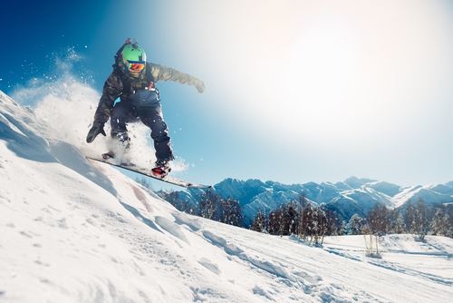Accidents Can Happen to Anyone
The importance of ski and snowboard safety can be a matter of life or death as recent events prove true. The recent death of a popular Vail teacher due to an unfortunate ski accident attests to the importance of safety precautions and safety education for anyone who wants to enjoy extreme sports in the snow. His passing is a tragic lesson that even the most experienced skiers and snowboarders can fall victim to accidents.
Ski and snow resort owners owe it to their patrons to take appropriate safety precautions. It is their responsibility to offer training courses, provide signage for dangerous areas, offer first aid, and employ ski patrol officers. But what happens when you have an accident? If you’ve been injured while on the slopes, you may have a personal injury case. Our team of experienced Colorado Springs personal injury lawyers can help you determine if you should pursue a settlement and will stand by your side during your case.
Contact us today at (719) 602-5888.
Ski and Snowboarding Safety Tips for Safer Slopes
- Never ski or snowboard alone. Skiing and snowboarding with a buddy is imperative to your safety. In the event of a fall, you will need someone to help you stay warm, seek help, secure any broken bones or lacerations, and keep you stable until help arrives. If you are alone, your risk of hypothermia or death is greatly increased.
- Be aware of your surroundings. Pay attention to signage, weather conditions, fallen trees, rocks, and other objects that could cause injury on the course. Be aware of other skiers or snowboarders and watch for patches of ice. Avoid distractions such as texting, cell phone cameras, and listening to headphones so that you can listen and watch with full attention.
- Wear protective equipment and clothing. Wearing a helmet is just as important when skiing or snowboarding as it is when biking, skateboarding, or even riding a motorcycle. Falls at high speeds or crashing into a tree without a helmet can prove fatal. Goggles, knee and elbow pads, fitted bindings, and footwear are all proper protective gear, too. Wearing the proper snow attire, usually in layers, is also important in preparation for sudden changes in conditions or if you are hurt and must remain on the slopes longer than planned.
- Use proper techniques and follow the rules. If you have never skied or snowboarded before, take a class or ask for lessons from friends. Observe the more advanced people on the slopes and follow the rules that are provided for YOUR safety. Practice etiquette and respect for others on the slopes so that everyone can go home safely at the end of the day.
- Take breaks. Eat healthy, well-balanced meals to keep your body temperature and energy up. Drink plenty of water. And lastly, take breaks. Pay attention to signs of fatigue such as yawning, soreness, weak muscles, or dizziness. Know your limits.
Call for a Free Consultation
If you are injured while skiing or snowboarding, and you believe someone else is at fault, you may have a case. Ski and snowboard safety is the responsibility of each individual skier or snowboarder, and negligence, careless and acting dangerously can cause serious accidents. Don’t let the blame, and the costs, fall on your shoulders. Our Colorado Springs personal injury lawyers can help you receive the settlement you deserve and get you on track for recovery.
Contact our firm at (719) 602-5888 to discuss the details of your case in a free consultation.
